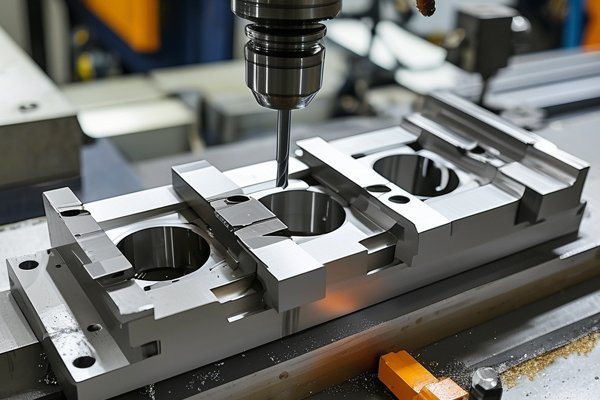Did you know that CNC turning technology has revolutionized manufacturing processes, producing components with tolerances as tight as ±0.001 inches? This astounding precision allows for designs that were once considered impossible or too costly to fabricate. As industries become increasingly reliant on custom, high-quality metal parts, understanding the capabilities and benefits of CNC turning is crucial.
With countless applications ranging from aerospace to automotive, the demand for precision-engineered components continues to rise. This blog will explore how CNC turning services can significantly enhance custom metal parts, including the challenges faced, innovative solutions, and advanced techniques that improve efficiency and quality.
—
Understanding CNC Turning: An Overview
CNC, or Computer Numerical Control, turning is a manufacturing process where a rotating workpiece is shaped by a cutting tool along a pre-programmed trajectory. Unlike traditional machining, which relies on manual control, CNC turning uses software that precisely guides the machinery. This technology not only increases efficiency but also enhances precision.
The Benefits of CNC Turning
—
The Role of CNC Turning in Custom Metal Parts
Unique Design Capabilities
CNC turning technology excels in producing custom metal parts designed for specific applications. Whether it’s intricate geometries required in aerospace or robust components for heavy machinery, CNC turning caters to diverse needs.
Case Study: Aerospace Components
In the aerospace sector, components must meet stringent safety and performance standards. CNC turning enables engineers to fabricate parts with exceptionally tight tolerances, ensuring their reliability in critical applications. For instance, turbine blades manufactured using CNC turning technology are designed to withstand extreme temperatures and pressures.
Enhancing Aesthetic Appeal
CNC turning also allows for the creation of visually appealing components. Featuring smooth finishes and complex shapes, these parts can enhance the overall design of a product. Designers can focus on creativity without being constrained by the limitations of traditional manufacturing methods.
Material Optimization
The choice of material can significantly impact the performance and cost of custom parts. CNC turning allows for the careful selection and use of materials to meet specific requirements, such as weight reduction or increased strength. For example, utilizing lightweight aluminum alloys in automotive components can enhance fuel efficiency while maintaining structural integrity.
—
Addressing Common Challenges in CNC Turning Services
While CNC turning offers numerous advantages, manufacturers may encounter various challenges:
Though CNC turning can reduce long-term production costs, initial investments in equipment, training, and software can be substantial. It’s essential to consider the return on investment (ROI) of CNC turning services, especially for companies with low production volumes.
Solutions:
As technology advances, there is an increasing demand for skilled operators who can manage CNC turning machines effectively. A shortage of qualified personnel can hinder production capabilities.
Solutions:

Navigating the complexities of CNC turning can be overwhelming for designers. Errors in design files can lead to costly production delays or compromised quality.
Solutions:
—
Advanced Techniques in CNC Turning for Custom Designs
Multi-Axis Turning
Modern CNC turning machines often come equipped with multi-axis capabilities, allowing for greater complexity in designs. A 5-axis CNC lathe, for example, enables simultaneous movement along multiple axes, significantly expanding the range of achievable shapes.
Automation and Smart Technology
Integrating automation and smart technology into CNC turning processes can further enhance efficiency. For instance, Automatic Tool Changers (ATCs) can quickly switch tools without manual intervention, enabling uninterrupted production.
Surface Finish Optimization
Achieving the desired surface finish can be paramount in many applications, particularly in industries such as medical devices or luxury goods. CNC turning allows for various finishing options that can enhance the durability and aesthetics of parts.
—
Case Studies: Successful Implementation of CNC Turning Services
Let’s take a look at some real-world examples where CNC turning services have played a crucial role in the development of custom metal parts.
Case Study 1: Automotive Industry
A leading automotive manufacturer faced challenges related to fuel efficiency and component weight. By transitioning to CNC turning services, they were able to create lightweight, high-strength components that not only improved vehicle performance but also adhered to environmental regulations. The advantages realized included reduced production times and improved product quality.
Case Study 2: Medical Devices
In the medical sector, a company specializing in surgical instruments required components that met stringent safety standards. With CNC turning, they produced parts with exceptional precision while minimizing the risk of contamination through automated processes. As a result, they achieved faster production cycles and enhanced patient safety.
—
The Future of CNC Turning in Custom Metal Design
The landscape of CNC turning is evolving with advancements in technology such as Artificial Intelligence (AI) and the Internet of Things (IoT). These innovations allow for smarter manufacturing processes, predictive maintenance, and real-time monitoring of production quality.
Embracing Industry 4.0
As manufacturers embrace Industry 4.0 principles, the integration of CNC turning with smart technology will drive further efficiencies and customization. Real-time data analytics will facilitate better decision-making and enhance production workflows.
Sustainability Practices
Sustainability is becoming increasingly important across all industries. CNC turning can contribute to eco-friendly practices by minimizing waste and optimizing material usage. Companies that adopt sustainable solutions will not only meet regulatory requirements but also appeal to environmentally conscious consumers.
—
In summary, CNC turning services are fundamentally transforming the manufacturing landscape by providing unparalleled precision, versatility, and efficiency. Whether you’re in the aerospace sector requiring high-performance components or in the automotive industry looking to innovate, understanding the capabilities of CNC turning can unlock new possibilities for custom metal parts.
As industries continue to evolve, embracing CNC turning technology is essential for staying competitive. By overcoming initial challenges, leveraging advanced techniques, and adapting to future trends, businesses can ensure they remain at the forefront of manufacturing excellence.
Remember, investing in CNC turning services is not just about improving production efficiency; it’s about enhancing product quality, fostering innovation, and laying the groundwork for a sustainable future. Therefore, take time to consider how CNC turning can empower your manufacturing processes and drive your business toward success.






